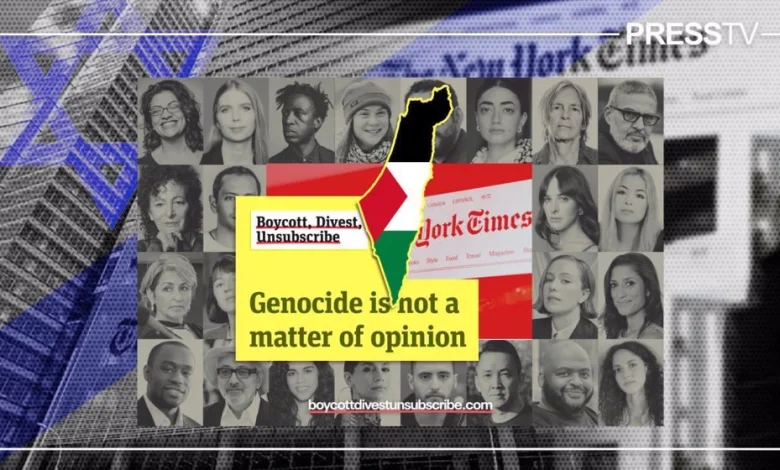NYT’s anti-Palestine bias back in spotlight as leading contributors boycott paper

By Maryam Qarehgozlou
Over 300 writers, activists, scholars, and politicians — including 150 former New York Times contributors — recently signed a joint letter boycotting the newspaper and pledging not to write for its Opinion section until it ends its anti-Palestinian bias.
Prominent figures — including Palestinian-American Congresswoman Rashida Tlaib, author Sally Rooney, actor Hannah Einbinder and academic Mahmood Mamdani — urged the American daily to reform its newsroom, call for a US weapons embargo on Israel, and retract its debunked report on sexual violence during the Hamas-led October 7 operation, Al-Aqsa Flood.
The letter, titled “genocide is not a matter of opinion,” calls out the NYT’s blatant double standards.
“Since Israel began its genocidal war on Gaza, The New York Times has obfuscated, justified, and outright denied the occupier’s war crimes, thus continuing the paper’s decades-long practice of acting as a bullhorn for the Israeli [regime] and military,” it reads.
The letter further notes that the Times shapes US foreign policy narratives with its lopsided reportage.
“As much as any weapons manufacturer, the media is part of the machinery of war, producing the impunity and bigotry that enables and sustains it,” it states.
The signatories also urge the paper not to employ journalists who have served in the Israeli military, saying, “The Times must correct decades of biased, racist reportage on Palestine by reviewing and revising its style guide, methods of sourcing and citation, and its hiring practices.”
It also demands the retraction of “Screams Without Words,” a 2024 report claiming — without substantiated proof — that Hamas “weaponized sexual violence on October 7,” which was later debunked by several independent media outlets.
The signatories likened the debunked report to the Times’ infamous misreporting on Iraq’s “weapons of mass destruction” in 2004 that led to years of devastation in the Arab country.
They further called on the newspaper’s editorial board to “use its significant influence to call for the end of American weapons transfers to Israel.”
The letter stressed that the ongoing fragile ceasefire in Gaza, repeatedly violated by Israel, cannot stop the devastation: “Only an arms embargo can deliver a lasting ceasefire,” it reads.
The letter was issued by a coalition including Writers Against the War on Gaza, the Palestinian Youth Movement, the Right to Return Coalition, National Students for Justice in Palestine, and the Democratic Socialists of America.
Other signatories include Middle East scholar Rashid Khalidi; whistleblower Chelsea Manning; European Parliamentarian Rima Hassan; Canadian physician and author Gabor Maté; activist Greta Thunberg; writers Sophie Kemp and Rupi Kaur; and actors Hari Nef and Indya Moore.
✍️ Feature – New York Times’ Pulitzer Prize for Gaza war coverage a travesty of journalism
By Maryam Qarehgozlouhttps://t.co/Ox8I1wFFMi
— Press TV 🔻 (@PressTV) May 9, 2024
NYT’s role in shielding Israel from accountability
The New York Times has been at the forefront of spreading disinformation since the start of Israel’s genocidal war on Gaza in October 2023, helping shield the Israeli regime from accountability.
This comes amid near-total destruction of Gaza, an Israeli-engineered famine declared in August, and a death toll of over 68,500 Palestinians — most of them women and children.
Through selective language and narrative framing, the Times amplified unfounded allegations against Hamas, such as fabricated claims of rape, to whitewash and downplay Israel’s war crimes, while genocide and Holocaust scholars, human rights organizations, and a UN expert panel have all affirmed that Israel has been carrying out genocide in Gaza since 2023, as the assault continues in the besieged territory and the West Bank.
In April 2024, an internal New York Times memo revealed strict editorial instructions to avoid terms like “genocide,” “ethnic cleansing,” “occupied territory,” “Palestine” (except in “very rare cases”), and even “refugee camps” in coverage of Israel’s bombardment of Gaza.
The memo further discouraged “emotionally loaded” words such as “massacre,” “slaughter,” and “carnage” when referring to Israeli genocidal attacks on Gaza, while allowing stronger language for Israeli deaths or Hamas operations.
Activists have long criticized the Times for enforcing systematic editorial censorship — deliberately muting language that could frame Israel’s actions as war crimes or challenge US complicity.
This manipulation shapes public discourse, erases Palestinian suffering, and privileges Israel’s narrative to maintain American geopolitical interests.
A debunked story
The NYT’s fake report, “Screams Without Words,” was published in December 2023 and relied heavily on trumped-up claims of rape and sexual violence by Hamas resistance fighters.
Many of its stories were unverifiable, most sources were anonymous, and several families of alleged victims publicly contradicted the accounts.
The article, written largely by two inexperienced freelancers based in Israeli-occupied territories, faced immediate backlash. After scrutiny, the paper quietly altered some details but insisted its reporting was “sound” and refused to retract it.
Independent investigations by the Press TV website, October 7 Fact Check, Mondoweiss, Electronic Intifada, The Grayzone, and The Intercept revealed that the story was riddled with contradictions, false testimony, and zero forensic evidence.
One of the most glaring fabrications concerned Gal Abdush, referred to as “the woman in the black dress.” The Times depicted her as a rape victim killed on October 7 — a story her family denounced as “invented,” saying they were never informed the paper would use her case to push false claims.
A spokesperson for Kibbutz Be’eri also dismissed the rape allegations as “not true.”
Following months of criticism — including a letter from more than 60 journalism professors questioning the report’s integrity in April 2024— the Times still stood by its story and refused to issue a retraction.
✍️ Investigation – One year of Al-Aqsa Flood: How NYT massacred facts about Israel’s genocide in Gaza
By Maryam Qarehgozlou https://t.co/q87oUC8CPT
— Press TV 🔻 (@PressTV) October 6, 2024
Skewed coverage
According to an Intercept analysis of major media coverage, The New York Times, Washington Post, and Los Angeles Times showed a consistent bias against Palestinians during the first six weeks of Israel’s onslaught on Gaza.
The study of over 1,000 articles revealed that these outlets devoted far more attention and emotional language to Israeli victims than to Palestinians, despite the vastly higher Palestinian death toll.
Terms like “massacre,” “slaughter,” and “horrific” were overwhelmingly used to describe attacks on Israelis, while Palestinian deaths were reported in neutral or passive language.
Coverage of the unprecedented killing of Palestinian children and journalists — thousands of whom perished in Israeli bombardments — was strikingly limited, with “children” appearing in only two headlines across more than a thousand stories.
US media also disproportionately emphasized antisemitic incidents compared to anti-Muslim racism after the October 7 operation, mentioning antisemitism nearly seven times more than Islamophobia.
Overall, the coverage dehumanized Palestinians, turning their suffering into abstract statistics rather than personal tragedies, reinforcing a pro-Israel framing of the war.
The Intercept said the imbalance in mainstream media shapes public perception and US political attitudes, while younger audiences increasingly turn to social media for alternative narratives about the events in Gaza.
✍️ Feature – Devil’s advocate: How Western media whitewashed Israel’s attack on Gaza-bound aid ship
By Maryam Qarehgozlou https://t.co/Mj5yiFPQ9w
— Press TV 🔻 (@PressTV) June 11, 2025
Bias by omission
Marginalizing the Palestinian narrative is the norm in Western media coverage, even when it comes to blatant crimes under international law, such as attacks on hospitals or press institutions.
“Bias by Omission: How Israeli Occupation Crimes Are Filtered in Western Media,” an Al Jazeera Media Institute article, explores how major Western outlets, including The New York Times, systematically omit or downplay Palestinian suffering, Israeli occupation, and key aspects of narrative framing — particularly around hospitals, casualty reporting, and language usage.
The article exposes how the Times has erased Palestinian suffering through what media scholars call “bias by omission.”
Rather than merely slanting its language, the paper filters the narrative itself — excluding testimonies, ignoring massacres, and minimizing Israeli war crimes to protect Israel’s image and US interests.
Even when the Times published a rare opinion piece by American surgeon Dr. Feroz Sidhwa detailing atrocities in Gaza’s hospitals, it faced a smear campaign from Israeli and US pro-Israel figures.
The paper was forced to defend its reporting — a reflection of how Palestinian realities are allowed into mainstream US media only under immense scrutiny and pressure.
Historical patterns of censorship
The article notes one striking statistic: between 1970 and 2019, Palestinian voices accounted for only 1.8% of the Times’ 2,490 published op-eds.
Another academic study using AI techniques found that 90 percent of the 33,000 Times articles related to the First and Second Intifadas focused on the Israeli narrative — a trend that has intensified with each successive war, up to the ongoing genocide.
This imbalance continues today: the paper ignored the Israeli killing of Gaza’s leading physician, Dr. Marwan Sultan, and his family, even as British and independent US outlets reported on Israel’s deliberate targeting of medical teams.
Instead, the Times amplified Israeli military claims — such as non-existent Hamas tunnels beneath hospitals — later disproven, without issuing corrections or accountability.
Gatekeeping Palestinian suffering
This pattern reflects how the Times functions as a “gatekeeper” of Western propaganda — deciding which lives matter and which stories the world sees, says the report.
By omitting war crimes and human tragedies that expose Israeli aggression, it reinforces Washington’s narrative and shields its ally from global condemnation. In doing so, the paper abandons journalism’s core ethics and becomes, as activists put it, a mouthpiece for US power and Israeli occupation.
In January 2024, a report exposed how leading US newspapers — including The New York Times, The Washington Post, and The Los Angeles Times — systematically distorted coverage of Israel’s war on Gaza, aligning their narratives with Israeli military and political positions.
Journalists from these outlets even embedded with Israeli occupation forces, producing reports filtered through the regime’s army censorship.
This pattern, the analysis showed, turned Palestinian suffering into background noise while amplifying Israeli perspectives and emotional framing.
Drawing on The Intercept’s data-driven study of over a thousand articles, the report found a dramatic imbalance: for every two Palestinians killed, only one mention appeared in coverage, while each Israeli death received eight.
Terms like “massacre,” “slaughter,” and “horrifying” were overwhelmingly reserved for Israelis, reinforcing a one-sided emotional narrative.
Despite the unprecedented killing of thousands of children and hundreds of journalists in Gaza, these tragedies were almost ignored by the three papers.
Media critic Sana Saeed, among those who signed the boycott letter, said in a social media post that the Times has an “aura of authority that has allowed it to remain complicit in crime after crime, with near impunity.”
“It should be shameful to be a part of and uphold this institution that intentionally has manufactured justifications and propaganda for the extermination of the Palestinian nation,” Saeed said.





